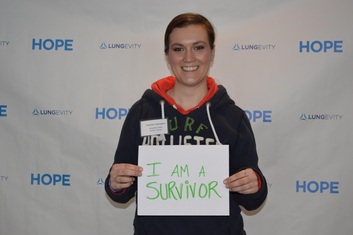Sure any publicity can be considered good publicity when talking about raising awareness for a cause, but there are definitely misconceptions about lung cancer that shouldn’t be perpetuated or ignored. These misconceptions have led to a stigma that lung cancer is a preventable disease, one that only smokers get and that simply isn’t true.
Some of the stories in the media this month are about quitting smoking. Yes I think people should never start smoking and if they smoke I think they should quit for many health reasons, but I don’t think linking a “quitting smoking” story to Lung Cancer Awareness Month makes any sense.
Fact #1 Smokers are not the only people who get lung cancer.
Well over 60 % of people diagnosed with lung cancer either never smoked a day in their lives or quit smoking decades ago. Radon and asbestos cause lung cancer and genetics may play a part in who develops lung cancer as well. Most recently the World Health Organization just listed air pollution as a cause of lung cancer and people being diagnosed with it are getting younger and younger. Smoking kills about 400,000 people every year and it’s a serious deadly habit. But not all smokers get lung cancer.
People who smoke can get lung cancer. Never smokers who lived healthy and active lifestyles can get lung cancer. People who quit smoking and lived decades as a nonsmoker, get lung cancer. Children, teens and young adults can get lung cancer too. Please don’t write a story about quitting smoking and link it to Lung Cancer Awareness Month unless the person who quit smoking also got lung cancer. Anyone with lungs can get lung cancer and this month is for them too.
Fact #2 Quitting Smoking Doesn’t Eliminate Your Lung Cancer Risk.
Those who have a smoking history will ALWAYS have a higher risk of developing lung cancer. Most of the stories I’ve read about quitting smoking this month imply that those who quit smoking are now safe from ever getting lung cancer. That’s not true. While quitting smoking eliminates or reduces your risk of certain diseases, stroke and other cancers, you will always be at a higher risk of developing lung cancer than a never smoker. (The key is to never start smoking!) The damage to your lungs stops when you quit smoking but it’s not enough to tell smokers to quit and leave them with a false sense of safety. Ex-smokers need to be more aware of their bodies and any symptoms that arise.
While there is currently no early detection test for lung cancer, there is lung cancer screening in many areas for people over the age of 55 with a 30 pack year smoking history. Quitting smoking doesn’t eliminate your lung cancer risk but catching lung cancer earlier is your best chance at survival. Please don’t write a story about quitting smoking unless you include information about continued lung cancer risk and screening programs to help detect lung cancer early. And please don’t write a story about quitting smoking during Lung Cancer Awareness Month unless the person in your story also got lung cancer.
Fact #3 Stories about Smoking during Lung Cancer Awareness Month Hurts the Cause
Lung Cancer Awareness Month was created to bring awareness to a disease that does not discriminate. Historically lung cancer has been the lowest funded cancer even though it kills more people than any other cancer. Why? For far too long lung cancer has been thought of as simply a preventable disease and that if people didn’t smoke they wouldn’t get it.
Lung Cancer Awareness Month was created to eliminate those misconceptions and that stigma. While you can lower your risk of developing lung cancer, you cannot prevent it.
We don’t typically see news stories about “causes” of other cancers during their awareness months. I agree that smoking cessation is important. I also believe in radon testing and awareness about asbestos, carcinogens and pollutants. While the collective “we” work on improving our health and become more aware of the environmental hazards around us we also need to find an early detection test for lung cancer and more treatment options to extend survival for people who are diagnosed with this disease- no matter what the cause.
For more information about lung cancer, please visitwww.lungevity.org

 RSS Feed
RSS Feed
